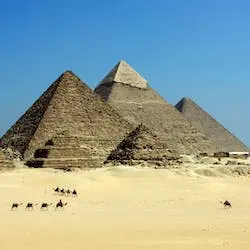
Level 1:
Egypt wants to take care of its pyramids. So, they are trying to fix a pyramid called Menkaure. They are using strong blocks for this. Some people, like Monica Hanna, do not like this. She says it is wrong. But, Egypt wants its pyramids to last long.
Level 2:
Egypt has begun a controversial project to restore one of its most famous landmarks - the Menkaure Pyramid. They aim to put back granite blocks that have fallen off over time. Mostafa Waziri, a top official, called it ‘the project of the century’. But not everyone believes it’s the right step. Egyptologist Monica Hanna criticized the project, calling it absurd. However, in Egypt, where tourism is very important, keeping the pyramids in top shape remains a priority.
Full Story:
History is coming alive, quite literally, in Egypt. The country has embarked on an ambitious project to restore one of their greatest treasures - the Menkaure Pyramid. This pyramid, which is part of the iconic trio of the Sphinx and the larger Khafre and Cheops pyramids at Giza, has started seeing granite blocks being reinstalled at its base.
This step has been hailed by some as ‘the project of the century’. Mostafa Waziri, the head of Egypt’s Supreme Council of Antiquities, even shared a video of workers diligently placing the granite blocks back on the pyramid. It’s the start of what is expected to be a significant three-year restoration project, aiming to return the pyramid to its original glory.
However, this project is not without controversy. Not everyone is thrilled about this attempt to recreate the past. Critics, like Egyptologist Monica Hanna, have publicly expressed their discontent. She referred to this restoration as absurd and a clear violation of international renovation principles. Despite the backlash, the project continues to press forward, a testament to Egypt’s dedication to heritage preservation.
The heart of the debate lies in balancing the competing demands of preserving history and maintaining economic stability. Much of Egypt’s economy relies on income from tourism. The awe-inspiring pyramids play a major role in attracting millions of tourists to the country annually, making their upkeep crucial. Yet, critics argue that preservation should not involve altering the pyramids beyond repair or recreating something long lost.
This debate goes beyond the pyramids. It reflects broader concerns about how Egypt, and indeed any country, manages its historical sites and cultural heritage. As these discussions continue to heat up, it will be interesting to see how Egypt navigates the fine line between preservation, restoration, and potentially irreversible intervention.
Restoration of Pyramids:
Advantages:
- Tourism Boost: Egypt’s economy heavily relies on tourism, and the pyramids are the country’s prime attractions. A restoration not only preserves these sites but can also attract more visitors.
- Cultural Preservation: Restoration helps keep an important part of Egypt’s history alive for future generations.
Disadvantages:
- Potential Damage: The restoration work, if not done properly, could cause irreversible damage to these historic structures.
- Violation of Principles: Critics argue that such restorations might violate international standards for preserving historical sites.
Navigating this debate requires understanding the cultural significance of these sites, the economic needs of the country and ensure a balance is struck between preserving history and ensuring its survival for future generations.
Questions:> Why has Egypt undertaken the restoration of the Menkaure Pyramid?
What are some of the criticisms related to this restoration project?
How does tourism factor into Egypt’s decision to restore the pyramids?
Why is the preservation of historical sites economically significant for Egypt?
Is it beneficial or detrimental to alter historical sites in the name of restoration?
Fill in the Blanks:
project, restoration, controversial, blocks, granite, expert, Menkaure, Tourism, heritage Egypt’s ________ to restore the ________ pyramid has sparked a ________ debate.
Mostafa Waziri from Egypt’s Supreme Council of Antiquities has championed this ________, referring to it as ‘the project of the century’.
The restoration involves reattaching ________ of ________ that had fallen over time.
Egyptologist Monica Hanna, a noted ________, criticized the work, calling it absurd.
________ revenue is crucial to Egypt’s economy, and the pyramids are central to the country’s appeal.
Despite the controversy, Egypt pushes ahead with its drive to preserve its national ________.
Difficult Words:
Restore - to bring back to original condition
Controversial - causing disagreement or heated discussion
Landmark - an important building or monument
Granite - a hard, crystalline rock
Absurd - beyond reasonable thought or belief
Tourism - travel for pleasure or business
Preservation - the act of keeping alive, intact, or free from decay
Critics - people who express judgement or disapproval
Intervention - to become involved in a situation to change the outcome
Irreversible - unable to be reversed or undone.




